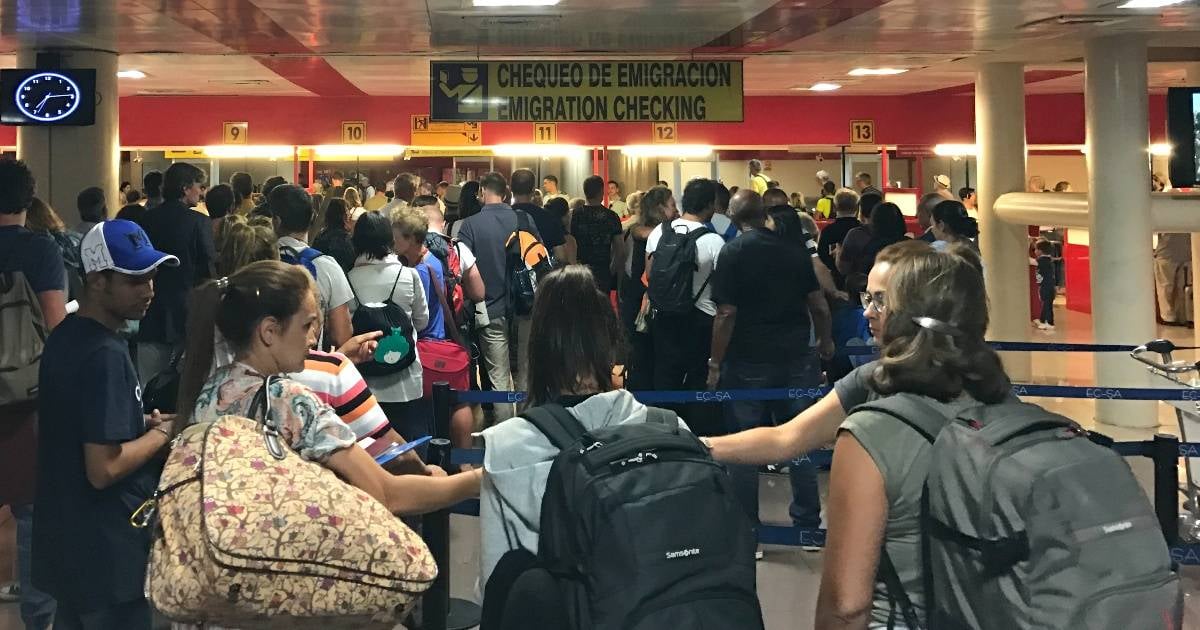In the midst of the most severe migration crisis Cuba has faced in decades, the regime of the Caribbean nation has estimated that three million Cubans are residing abroad. In an interview with the Associated Press (AP), First Colonel Mario Méndez Mayedo, head of the Directorate of Identification, Immigration and Foreign Affairs at the Ministry of the Interior, stated that currently, it is estimated that around three million Cubans, including both those born on the island and their descendants, are living overseas.
In the United States, the country with the largest Cuban community, there were approximately 1.3 million Cubans with residency at the end of April 2024. Additionally, there are about 300,000 in the process of obtaining residency and around 100,000 who arrived through special permits granted by the administration of President Joe Biden.
Smaller numbers of Cubans have emigrated to Spain, Mexico, and Italy, with notable communities also present in Chile and Russia. Over the past five years, Cubans have demonstrated that they hold citizenship in around 140 countries worldwide, according to the report.
New Immigration Laws to Be Debated
In this context, the Cuban government has announced that it will present a package of three laws to the Parliament to update citizenship regulations, as well as the rules for entry and exit from the country for both foreigners and nationals.
The Migration, Foreign Affairs, and Citizenship Laws will be debated by the National Assembly of People's Power in the session starting on July 17. These laws contain significant changes, such as the removal of the 24-month limit for Cubans residing abroad to re-enter the country without losing their social and property rights, including homeownership, according to the official.
Additionally, the new laws will allow Cubans living abroad to claim Cuban citizenship up to the grandchild level. While the new laws will also expand the rights and residency permits for Cubans who emigrated before the past decade, who currently face many restrictions, and for foreigners wishing to do business or settle on the island, they also enable the regime to regulate the entry of activists and opponents who are critical of the government.
To this end, the new laws will maintain conditions for "exceptional cases" related to "national security" or "public interest," as determined by the authorities. In previous years, Cuban political opponents have reported being prevented from leaving the country when invited to overseas activities by groups critical of the government, or from re-entering the island.
Méndez justified the controversial issue of "regulated" Cubans, stating that it must be maintained in the context of the "permanent aggression" that Cuba faces, referring to U.S. sanctions.
U.S. border authorities reported having encountered half a million Cubans between October 2022 and May 2024, a significant number for an island population of 11 million. Méndez, who recently referred to the mass exodus of Cubans over the past three years as "a new demographic and social scenario," emphasized that having precise emigration figures is crucial for establishing public policies on health, education, and social security.
Last week, the Cuban regime acknowledged the magnitude of the current migration crisis and revealed that 1.3 million Cuban emigrants maintain residency in Cuba but live in the United States.
Frequently Asked Questions About Cuba's Migration Crisis
Here are some common questions and answers regarding the migration issues facing Cuba and the new laws being proposed.
How many Cubans are estimated to live abroad?
The Cuban government estimates that around three million Cubans, including those born on the island and their descendants, are living abroad.
What changes are included in the new migration laws?
The new laws include the removal of the 24-month limit for re-entry, the ability for Cubans abroad to claim citizenship up to the grandchild level, and expanded rights and residency permits for emigrated Cubans and foreigners wishing to do business on the island.
Why are some Cubans "regulated" by the government?
The Cuban government maintains "regulated" status on certain individuals due to "national security" or "public interest" concerns, often preventing political opponents from traveling freely.
How significant is the migration crisis in Cuba?
The migration crisis is quite severe, with U.S. border authorities reporting encounters with half a million Cubans between October 2022 and May 2024, highlighting the significant impact on Cuba's population of 11 million.
